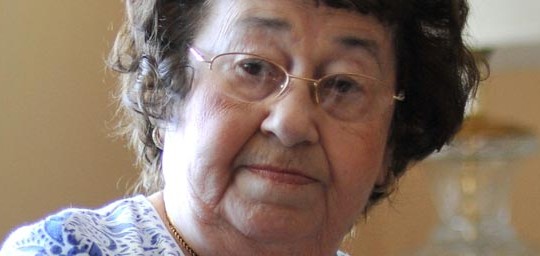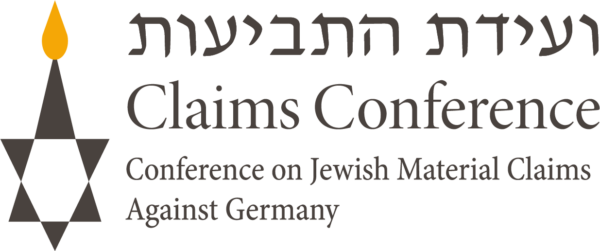Growing up in Czechoslovakia, Rene Hammond, née Koenigsberg, learned in school to speak fluent Hungarian, Czech, and English – skills she says equipped her for survival after the Nazis invaded.
On May 16, 1944, 18-year-old Rene and her family were sent to a ghetto, where a non-Jewish friend would sneak food to her. After three days, Rene’s family was taken by cattle car to Auschwitz. When they arrived, another inmate told Rene to quickly eat whatever food she had with her because the Nazis would soon take it away.
As the Jews were unloaded from the train, they were divided by men and women and then by young and old. Rene and her sister Agnes were showered and their heads shaved, but their parents were sent to the gas chambers. Rene did not know at the time what became of her brother.
Rene and Agnes were soon sent to a camp near Essen, Germany, where they marched daily to work at the Krupp ammunitions factory. It was here that they met a German man who told the girls that he would help them if at all possible.
In 1945, as the war was nearing its end and Allied bombings drew closer to the camp, the officers in charge would seek shelter in bunkers. The girls saw their opportunity and one day, while the officers were taking cover, they escaped the camp.
They hid in the basement of a bombed-out Jewish cemetery and made contact with the German man who had earlier offered to help. He brought them food and water. He soon brought them to his farmhouse where they burned their clothes and the farmer offered them whatever clothes they wanted from his daughter’s closet. This would later save them when Nazi soldiers stopped by the farmhouse; because the girls were wearing the farmer’s daughter’s clothes and looked like normal German girls they did not arouse suspicion.
Every day the German man would bring the girls boiled potatoes. To this day, Rene still considers boiled potatoes the most delicious food she’s ever eaten. The girls stayed at the farmhouse until liberation and the German family was later acknowledged as Righteous Gentiles by Yad Vashem.
Rene’s brother was liberated from Bergen-Belsen and reunited with his sisters. Rene’s sister would later testify at the Nuremberg Trials. After the war, Rene worked for the British Military in Frankfurt, where she met a soldier named Ralph Hammond who would soon become her husband.
The couple settled in New York in 1948. Rene became an accountant and they would later retire to Florida. Now an 85-year-old widow, Rene loves gardening and still travels across the country to visit her five children, six grandchildren, and 10 great-grandchildren.
Through Gulf Coast Jewish Family & Community Services, a recipient of Claims Conference funding, Rene participates in Holocaust survivor support groups and holiday parties. “The seder and holiday lunch celebrations mean a lot to me because I don’t have any family in the area. I would be very lonely on the holidays,” she says. “My father, a very kind and special man, used to make the most beautiful seders and I miss that so much. I hope we can keep having these holiday celebrations with the help of the Claims Conference. It really means so much to me.”
Rene also receives cleaning services through Gulf Cost JF&CS. “Some days I can hardly walk, not always, but sometimes,” Rene says. “These services make it possible for me to remain at home and not have to go to a nursing home.”
Rene receives a pension from Germany negotiated by the Claims Conference and had been paid under the Program for Former Slave and Forced Laborers.


